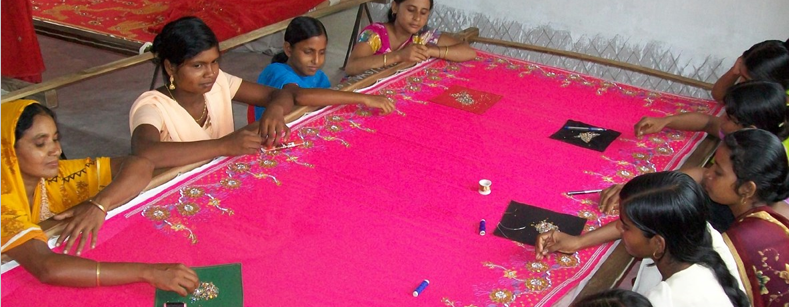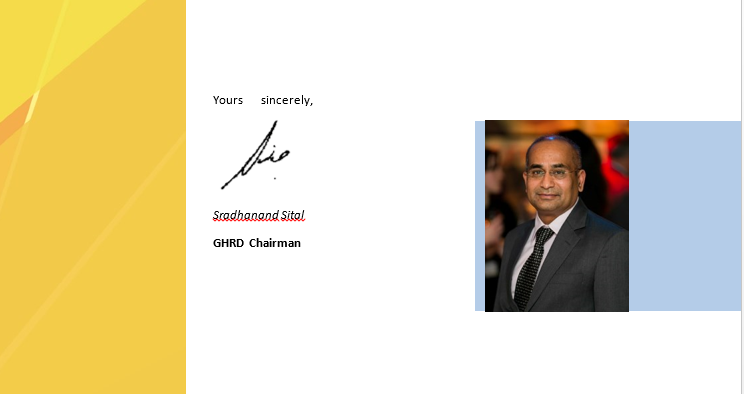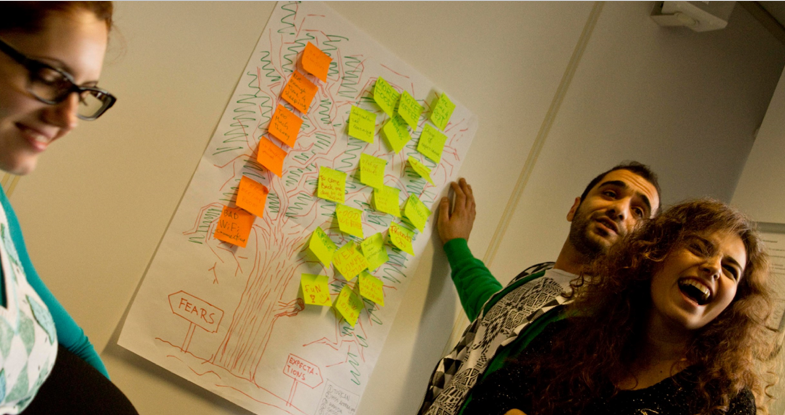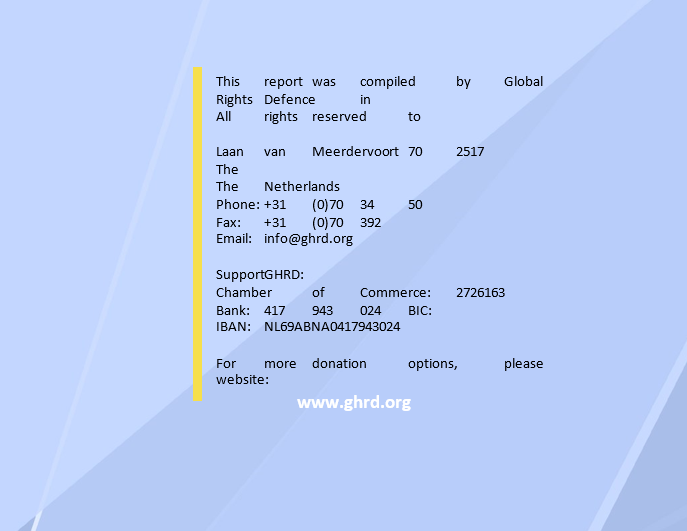Non-discrimination, the right of every individual to fully participate in society regardless of race, religion, gender or sexual orientation.
Following a prestigious grant from the Ministry of Foreign Affairs in 2012, Global Human Rights Defence began 2013 with a surge of motivation and a renewed sense of hope and responsibility for the future. 2013 proved to be a year of new challenges, ambitious goals and great achievements. With the grant we received from the MFA, my staff and I at GHRD put into place several important and necessary programs for minorities in Pakistan and Bangladesh. Our program ‘Raising Voices for Minority Rights’ is fundamentally aimed at raising awareness, increasing cooperation between NGO’s, Civil society and international organisations, training and empowing Human Rights Defenders in South Asia, researching and documenting human rights violations through fact findings and investigation and also employing methods to assist minorities who are struggling to have their voices heard or their experiences registered with authorities.
Our goals this year was, amongst others, to build on programs we had previously implemented such as the Coalition for Religious Minorities, launch new programs such as the Legal Assistance Program, strengthen established relationships with other organisations both national and internationally, create new opportunities and cooperation options for both ourselves and our partners in the field and continue to provide excellent training and capacity building workshops to assist defenders. I am happy to report that together with a small team of dedicated staff and interns and you, the passionate public, we have achieved these goals and so much more.
I am also pleased to announce that this year GHRD marked its 10 year anniversary, an important milestone. With this in mind, I take this opportunity to sincerely thank all of you for your unconditional support, hard work and unwavering commitment to GHRD over the past 10 years, both in the field in South Asia and across Europe. I look forward to more joint endeavours in the fight against discrimination.
BANGLADESH
In 2013, Global Human Rights Defence continued to promote and defend minority rights in Bangladesh through successful campaigns, lobbying activities and awareness raising events. This year, GHRD’s priorities were monitoring the elections in Bangladesh and conducting legal and policy research on sexual minorities in the country in addition to monitoring and documenting attacks and human rights abuses against Religious and Ethnic minorities. GHRD also initiated a human rights defenders network in Bangladesh consisting of various local grassroots organisations who work on minority rights. GHRD worked closely with this network in order to monitor human rights violations against minorities and to organize national projects which addressed issues faced by minorities. The first-hand information provided by local partners was used to lobby and advocate for minority rights as well as improve the situation of human rights defenders in Bangladesh, both nationally and internationally.
This year, GHRD held its first active engagement with the United Nations Mechanism in Geneva In April
2013, GHRD participated in a review of Bangladesh’s human rights record under the 16th session of the Universal Periodic Review (UPR) held in Geneva. During this UPR, GHRD successfully engaged with permanent missions to the United Nations (UN) and enabled Bangladeshi human rights defenders to participate in the international human rights mechanism. GHRD’s written submission to the UPR was presented to the Office of the High Commissioner for Human Rights (OHCHR) as well as members of the UN Human Rights Committee on Minority Rights and Indigenous Peoples. GHRD continued its engagement with the UN mechanism throughout the year by attending forums which addressed minority issues as well as presenting human rights reports to UN entities.
GHRD also presented their preliminary report of legal and policy research on sexual minorities which was co-written with a local Bangladeshi partner organization to the EU institutions, MEPs and civil society organisations working on the rights of sexual minorities in Europe and South Asia.
GHRD continued with the implementation of human rights programmes in Bangladesh and organised two capacity building training workshops for the human rights defenders network in Bangladesh. GHRD strengthened its relationship with local partners whilst supporting sustainable human rights projects which were being carried out in Bangladesh by the network of Bangladeshi human rights defenders
16th Universal Periodic Review for Bangladesh: UN’s Sixth Minority Forum on Minority Issues
GHRD participated in the Sixth session of the Forum on Minority Issues in November 2013 this year focused on the theme, “Beyond freedom of religion and belief: Guaranteeing the rights
INDIA
of religious minorities”. This Forum provided a platform for United Nations Member States and specialized agencies, international organisations, national human rights institutions, civil society organisations, academics and experts to discuss draft recommendations with a view to drafting a final document which will be presented by the Independent Expert on minority issues to the Human Rights Council at its 25th session in March 2014.
The outcome of this Forum highlighted the need for interfaith dialogue, acceptance and trust. The forum concluded that religion can be a force for peace, therefore ensuring the rights of religious minorities and their ability to express themselves could be a significant contribution towards achieving peace.

A New Life, A New Chance (Karin)
According to the report, ‘Anti Human Trafficking, 2013’ presented by the United Nations Office on Drug and Crime (UNODC), more than 19,000 women and children were reported missing in West Bengal. Out of these only 6000 were traced. West Bengal is considered one of the most vulnerable places for trafficking as it serves as a central location for intra and interstate trafficking but also for international trafficking. Girls and women who have been trafficked remain vulnerable even after being rescued as they are yet to develop the skills and abilities they need to positively transform their lives.
In 2013, GHRD in cooperation with the Jabala Action Research Organization launched a year long project, “A New Life, A New Chance” in West Bengal to support women and girls who have been trafficked. The project intended to equip the survivors with skills and abilities to effectively integrate into society. The project was also aimed at empowering the participants and guiding them towards financial independence and self-reliance. To facilitate this goal Jabala and GHRD provided educational and practical training workshops assisting trafficked victims to gain a tradable skill. This would in turn effect long term financial independence for the participants, the ultimate goal of the project.
Due to “A New Chance, A New Life” project, 50 individuals have participated in vocational skills training such as embroidery, making sari’s (a south Asian dress) and herbal gardening as well as academic classes where they are taught literacy and about human rights. Since the project was completed, 23 participants have found employment as Outreach workers in hospitals, 7 in hotels and 15 participants have started earning an income from Sari making and gardening work.
“A New Chance, A New Life” is an essential project helping rehabilitate victims of trafficking through empowerment and the provision of a strong support system. Global Human Rights Defence is proud to have been able to facilitate this project with funding and resources which has assisted in realizing the goals of the project.
2013 was yet another bloody and violent year for Pakistan who bore witness to numerous gruesome attacks across the country. It was also a monumental year as the elections meant the first constitutional transfer of power in history. In order to document this historic event, Global Human Rights Defence, together with partners in the field and civil society groups conducted an election monitoring program for the national elections culminating in a lengthy report on the Rights of Minorities in the elections. This took place over a five month period from January to May 2013 and was specifically targeted at highlighting the plight of Pakistan’s marginalised minorities. Political party representatives were urged by civil society to amend their party manifestos’ to reflect the situation and rights of minority groups living in Pakistan. The political representatives assured the inclusion of the recommendations drafted in the consultative meeting after briefing the participants about their party manifestos’ regarding the Minorities
In addition Minority issues were highlighted in the national and international media where possible through press conferences and media outreach.
PAKISTAN
Following numerous devastating attacks against minorities, GHRD carried out a number of fact findings to document and monitor human rights violations against marginalised groups. In close cooperation with our field partners, GHRD successfully investigated 68 cases in the provinces of Punjab, Sindh and Khyber Pakhtunkhwa. GHRD’s assistance was found to be extremely useful in areas where police corruption and targeted attacks against minorities are commonplace. Minorities face an uphill struggle to file complaints against their attackers making it near impossible for the most basic of human rights, the access to justice, to be implemented. In an effort to combat this and encourage minorities to file complaints GHRD provided Financial Assistance to victims to continue with their case. To date this has been done for two cases.
One of GHRD’s goals for 2013 was to increase the promotion and protection of Religious Minority Rights which form a part of the 1973 Constitution of Pakistan. In order to achieve this, GHRD worked solidly to empower and support the previously established Coalition for Religious Minorities (CRM), a network of civil society organisations made up of different religious backgrounds, scattered across three provinces and completely dedicated to this cause. GHRD appropriately equipped members of the CRM organisations with adequate skills, knowledge and training to conduct activities and outreach. We provide training and capacity building workshops, organized strategic planning meetings throughout the year, issues press releases and held press conferences following severe attacks, one of the issues releases was covered by local newspapers which was a significant achievement in establishing the CRM.

Fight Discrimination – Equality for All
NEPAL
In Nepal, the Dalit population represents 11.8% of the population. In addition to being at the bottom of the caste, class and gender hierarchies, they are also far behind on almost all the development indicators. Vulnerably positioned at the bottom of Nepal’s caste, class and gender hierarchies, Dalit women experience widespread and deeply-rooted gender and caste discrimination and violence as a result of profoundly imbalanced social, economic and political power equations.
In cooperation with GHRD, the Village Development Foundation (VDF) launched “Fight Discrimination,
Equal Rights for All”, a project based in the central Terai region of Nepal. This project is geared towards addressing problems faced by women and children, the poor and the Dalit community.
This project empowers the poor and minority communities to claim their rights i.e. participation, awareness to their rights, stop child marriage and untouchability practices through outreach including literacy training and workshops designed to raise awareness about human rights and specifically the ones which affect them

ACHIEVEMENTS:
• Established Human Rights Watch groups among marginalised women and the poor with the aim of reducing child marriages and untouchability practices;
• Raised awareness on human rights through legal awareness training and campaigns;
• Collected information on child marriages, domestic violence against women and untouchability practices with the aim to measure the increased awareness on human rights.
INTERNATIONAL DAY EVENTS
In 2013, GHRD continued its activism through peaceful means with the aim of promoting human rights across South Asia. With a small limited budget GHRD utilized cost effective strategies to lend financial and moral support for awareness raising activities in Bangladesh, India, Nepal and Pakistan. In commemoration of International Days such as the International Day against Homophobia; International Day for the Elimination of Racial Discrimination, International Women’s Day and the like, GHRD supported numerous activities including mass public actions such as cultural performances.
The International Day Events involved 25 partnerships, 50 grass roots organizations and 45 activities reaching thousands of people across the world. There were various participants from all walks of life with a healthy mix of culture, race, age, gender and profession. These included politicians, local leaders, religious leaders, police officers, students, human rights activists, lawyers, entrepreneurs and children of all ages. In addition visibility and public awareness of various human rights and issues was significantly increased owing to coverage by over 140 media outlets such as radio, television and newspapers.
Europe
Global Human Rights Defence organized a week long Youth in Action project called “Promoting and Protecting Rights”, which brought 20 participants working for civil society organisations in Eastern Europe, the Caucasus and the Netherlands. In the Caucasus countries as well as in the European countries the ethnic, religious, linguistic and sexual minorities are facing discrimination and human rights violations. Therefore the objective of the program was to inspire the participants to initiate projects that empower disadvantaged minority groups in their home countries.
The participants of January 2013 Youth-in-Action project were from Armenia, Azerbaijan, Georgia, Montenegro, Greece and Turkey and The Netherlands. The project involved trainings on human rights education, study visits to grassroots organisations, workshops, discussion sessions and meetings with local policy makers. These activities gave an opportunity to participants to collect information and share best practices on the field to be used to cultivate their own projects in their counties.
EDUCATION
GHRD introduced a combination of formal and informal educational techniques to stimulate creativity, critical thinking, and human rights based approaches to develop new skills and competences among participants. The project ended with the prospect of creating sustainable programmes and projects for the rights of minorities in the Caucasus countries and Europe
South Asia : Raising Voices for Minority Rights- Train the trainers
Bangladesh and Pakistan
Global Human Rights Defence organized two capacity building trainings in 2013, for human rights defenders from Bangladesh and Pakistan.. The training the knowledge of human rights defenders not only in reporting and monitoring human rights violations but also in building strong communication strategies for their
organisations.
Film and Audio Visual Content
Global Human Rights Defence (GHRD) produced a documentary called Pakistan: A defining moment. The documentary touches upon various human rights issues in Pakistan. It also gives a voice to local human rights defenders who are collaborating with GHRD to promote and protect the rights of minorities in Pakistan. The documentary has been screened in Pakistan and The Netherlands. The country wide tour of the film, “Pakistan: A defining moment” in The Netherlands enabled audience from different backgrounds including students and young professionals to understand and reflect on the human rights situation in Pakistan.

Social Media
GHRD has established a solid social media strategy in order to engage with a wider audience. We have significantly increased our followers on Facebook, Twitter, YouTube and our Human Rights Blog which has enriched our interactive interaction and ways to connect with audiences interested in Minority Rights in South Asia. GHRD also initiated a successful crowdsourcing campaign and raised more than adequate funding for the documentary tour project. This project was implemented with maximum outreach through screening events and social media channels
Furthermore, GHRD has successfully launched our long awaited, well written and beautifully designed website which is easier to navigate and allows people a comfortable and educational browsing experience. This has contributed to the success in GHRD’s communications and outreach.
 Awareness Raising: Postcards for Pakistan: Stamping out injustice one letter at a time
Awareness Raising: Postcards for Pakistan: Stamping out injustice one letter at a time
GHRD continued to raise awareness of human rights issues through education and activities bringing the public and human rights defenders together. We have taken our documentary “Pakistan: A defining moment” on tour among several universities in The Netherlands. The main goal was to engage and inspire the young audience to take action. “Pakistan: A defining moment” depicts the situation of human rights defenders and minorities through personal stories told by the defenders and victims of human rights abuses. GHRD believes these stories should be heard and we tried to develop a sense of responsibility among young people who have the power to make a difference. This was the reasoning which initiated our postcard writing campaign, “Postcards for Pakistan: Stamping out injustice one letter at a time” which accompanied the documentary tour. After each screening and discussion session, GHRD officers invited the audience to write to the UN Special Rapporteur on Religious Freedom or Belief, on a specially designed postcard. GHRD sent over 200 postcards collected over numerous documentary screenings at universities and colleges in Breda, The Hague, Maastricht and Rotterdam. The documentary was also screened during “The Movies that Matters event” organised by Amnesty International volunteers in Amsterdam.
LOBBYING
During 2013, GHRD continued to build and strengthen our relationships with national and international organizations and NGO’s. GHRD also made concerted efforts to create new working relationships to expand our network and resources of those committed to fighting discrimination. The focus for last year was geared towards the promotion and protection of Human Rights Defenders. GHRD met with the several Dutch authorities working on Human Rights including the Ministry of
Foreign Affairs Policy Advisors, the Human Rights Ambassador for Netherlands, Dutch MP’s and the Boom Network.
GHRD’s international lobbying efforts included meetings with the former Pakistani Federal Minister for National Harmony and current Chairman of the All Pakistan Minorities Alliance, the Director of the Baha’i Community and the Country Representative of Cordaid in Islamabad. In addition to this, GHRD also met with several international organisations together with our guest speakers as part of the EU Lobby tour. These included the European External Action Service, the European Parliament Intergroup in LGBT Rights, the Office of the High Commissioner for Human Rights, United Network of Young Peace builders and Amnesty International. These meetings provided a well-deserved opportunity to inform and discuss the issues and concerns of the minority community with high ranking officials, participate in a dialogue with a view to short term and long term improvement for the situations faced by minorities and among other goals, to raise the visibility and profile of the organisations and GHRD, the mandates and the types of work conducted.
GHRD rounded off 2013 on a high with the EU Lobby Tour. This was a great occasion to commemorate International Human Rights Day and also provided the perfect event to celebrate GHRD’s 10 year anniversary!
In collaboration, with MEP Jean Lambert and MEP Thijs Berman GHRD proudly launched its annual week long Lobby Tour in November. We kick started our tour with a notable conference at the European Parliament in Brussels. Several distinguished professionals attended the conference. Amongst them were European parliamentarians, NGOs, representatives of international authorities and several embassies.
The conference topic, “The Impact of Trade and Good Governance on Human Rights’ was specifically chosen to encourage discussion of concerns dominating the current affairs of the respective countries- Pakistan was awaiting the decision on their GSP Plus Status which has a trickle-down effect and ultimately has an impact on the lives of Pakistan’s minorities. This issue also inevitably brought Pakistan’s human rights record to the forefront which offered the EU and Pakistan an opportunity engage in a fruitful discussion regarding Human Rights issues. Similarly Bangladesh was preparing for the General Elections and facing numerous threats, violence and attacks surrounding the event. In view of Bangladesh’s treatment of the LGBT community, the country’s governance policies were brought into sharp focus. These respective concerns remained the centre point of both discussions where various representatives of Embassies, EU institutions, working groups, civil society organisations, academics, journalists and independent experts joined the discussion.
The Lobby Tour Conference was held at the European Parliament and consisted of two panels- Pakistan and Bangladesh. Human rights defenders from Pakistan and Bangladesh discussed the ongoing human rights violations and highlighted the campaigns and activities undertaken by civil society in Pakistan and Bangladesh aimed at protecting and promoting minority rights. Bangladesh speakers focused specifically on LGBT right whilst Pakistan speakers focused on the importance of the GSP Plus status and the effect it has for minorities and their rights. The tour also brought national and international policy makers and civil society organisations together with local human rights defenders from Bangladesh and
Pakistan.
Key speakers
•Mr. Thijs Berman – MEP of the PVDA (Netherlands Labour Party) and Member of the European Parliament
•Ms. Jean Lambert – MEP of the Green Party (UK) and Member of the European Parliament.
•Dr Siegfried Wolf, Director of Research at South Asia Democratic forum and Lecturer in International Relations and Comparative Politics at the South Asia Institute.
•Mr. I. A. Rehman – Journalist and Secretary General of the Human Rights Commission of Pakistan.
•Ms. Sameena Imtiaz – Founder and Executive Director of Peace Education and Development Foundation (PEAD)
• Mr. ASM Rahmat Ullah Bhuiyan – Head of Policy Advocacy and Communication, Bandhu Social Welfare Society (BSWS), Bangladesh
The Lobby tour provided a necessary platform for local defenders to draw attention to the problems faced by minority communities, provide an opportunity to lobby support, pave the way for reform and assist in establishing a network. GHRD also aimed to strengthen ties and cooperation between grass roots organisations, NGO’s and the international community. GHRD successfully accomplished all of these goals through the conference and bilateral meetings with important NGO’s and international organisations in The Hague and Brussels.
In 2012, GHRD was granted a prestigious award by the Ministry of Foreign Affairs, Netherlands.
LOOKING AHEAD
(MFA). With this incredible support and recognition from the MFA, 2013 proved to be a successful and rich year for GHRD. GHRD was able to fortify and expand previous projects whilst creating, establishing and implementing new projects such as the Legal Assistance Program.
Minorities face discrimination on a daily basis and are regular, easy targets for abuse, assault and persecution. With recent elections in Pakistan and elections due to take place in Bangladesh, there is a definite and compelling need to facilitate and foster strong relationships and interact with local grass roots organizations, civil society and international institutions to highlight the desperate situation in which the poor and outcast minority groups often find themselves and the need for assistance. Due largely to the limited number of organizations working on Minority Rights in South Asia, this need lends itself to the public’s ignorance regarding these issues, GHRD believes that drawing attention to these problems is vital to the sustenance and safety of these groups.
GHRD will continue to act as a strong bridge between local organizations and an international platform for promoting minority rights and the rights of those marginalized by society. GHRD aims to further capacity building by securing access to UN mechanisms and a large international lobbying platform.
GHRD will renew its commitment to supporting the LGBT Community. To facilitate this, GHRD will complete its investigation into LGBT Human Rights violations and aims, in 2014, to produce and publish a comprehensive report detailing the outcomes of our investigations.
 GHRD aims to empower the religious and sexual minorities in our focus countries through the Legal Assistance Program in Pakistan and Bangladesh, in 2014.
GHRD aims to empower the religious and sexual minorities in our focus countries through the Legal Assistance Program in Pakistan and Bangladesh, in 2014.
GHRD will expand the fact finding database of Human Rights violations and ensure that our partners continue to have the support, tools and resources available to conduct investigations, document and report on the violations against religious and sexual minorities that continue in Pakistan and Bangladesh.












